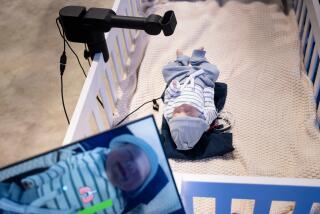U.S. Sets Rules for Eavesdropping Technology
- Share via
WASHINGTON — Electronic keys that unlock scrambled telephone and computer signals are being placed in the hands of two federal agencies, the government announced Friday.
The decision allows law enforcement officials to maintain wiretaps.
Atty. Gen. Janet Reno said the keys to the technology--known as Key Escrow Encryption--will be held by the Commerce Department’s National Institute of Standards and Technology and the Automated Systems Division of the Treasury Department.
The system uses a state-of-the-art microcircuit created by government engineers.
While it is a voluntary system, available to people who need to encode messages, the high security of the system is expected to attract customers. The scrambling technology would be included in phones and computers by their manufacturers.
Procedures for scrambling this material are so sophisticated that, without a key system like that being instituted, the government would be unable to break the codes and read or hear these messages--a problem causing great concern among crime-fighters.
Reno stressed that the keys will be used only for lawfully authorized wiretaps and that strict procedures are being set up to guard the keys.
The encryption system was formerly known as the Clipper Chip.
Each device will have two unique numbers, or “keys,” that would be needed by authorized government agencies to decode the transmissions. The keys are 80-bit codes unique to each device. Both keys are needed to decode the message.
When a wiretap is required, written requests will have to be sent to both agencies certifying that the wiretap has been legally approved.
The two components for that particular encryption device would then be provided to permit the messages to be decoded.
A statement from the White House noted that the rules will allow export of devices containing the new chip to most countries.
This prompted expressions of disappointment from the computer industry, however, which also had sought approval to export equipment with other encryption devices.
Software buyers in other countries are demanding programs with encryption features and the inability to sell such items will hinder U.S. sales overseas, the Business Software Alliance warned.
Key encryption systems developed by the government are unlikely to be acceptable to many customers, the alliance said. And it expressed concern that the new system might be made mandatory in the future.
A White House statement released Friday, however, said that “if encryption technology is made freely available worldwide it would no doubt be used extensively by terrorists, drug dealers and other criminals to harm Americans both in the U.S. and abroad.”
Therefore export of the most sophisticated encryption technology will remain restricted, the statement said.






